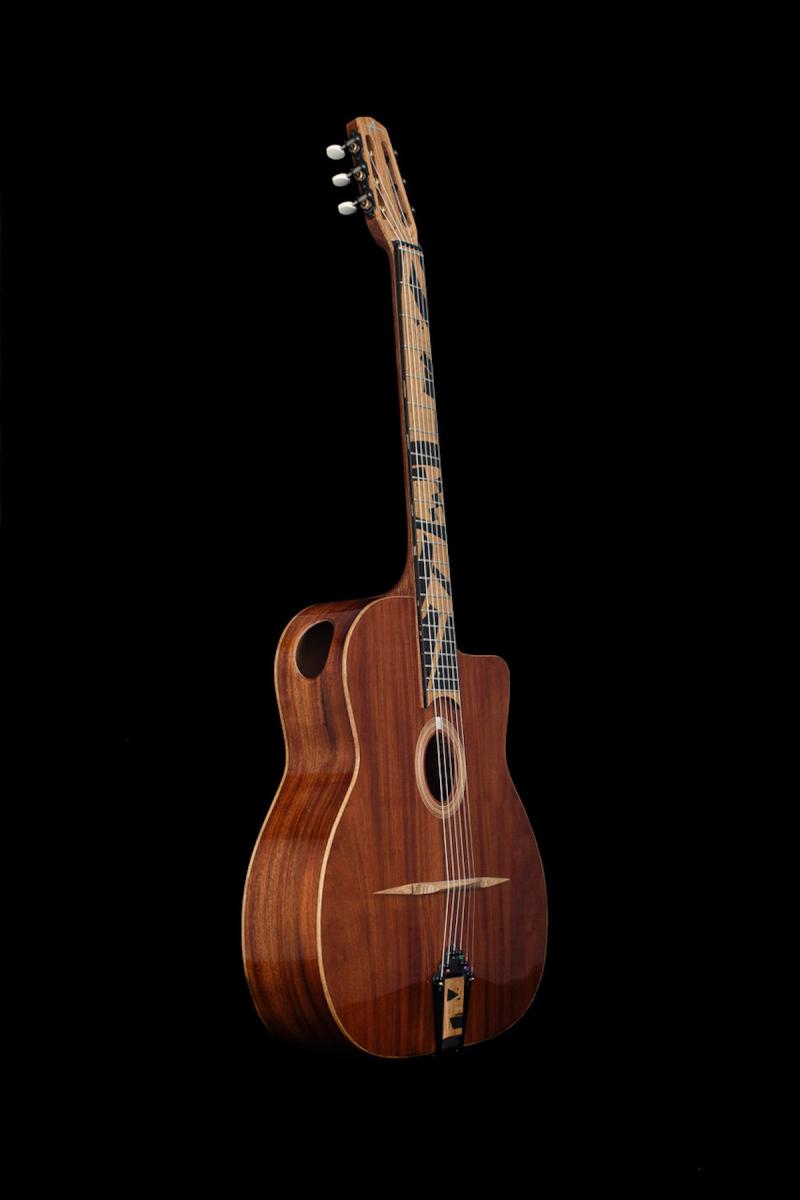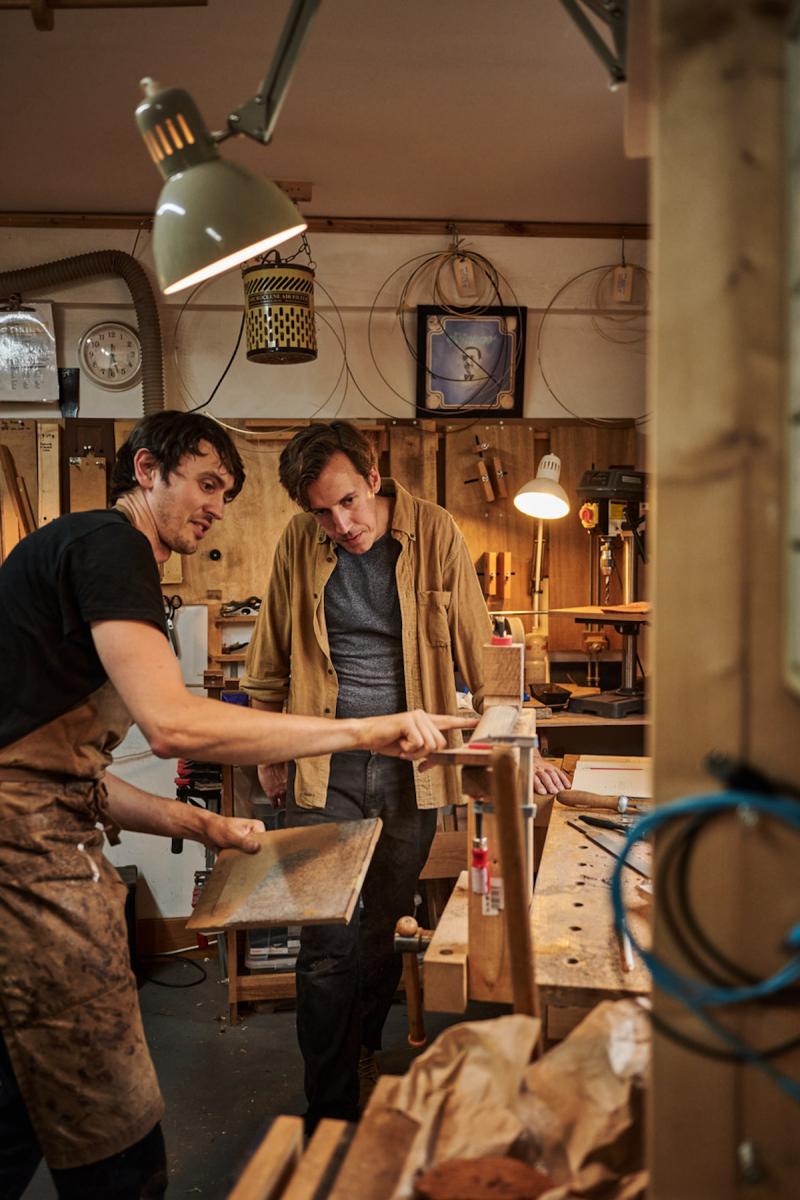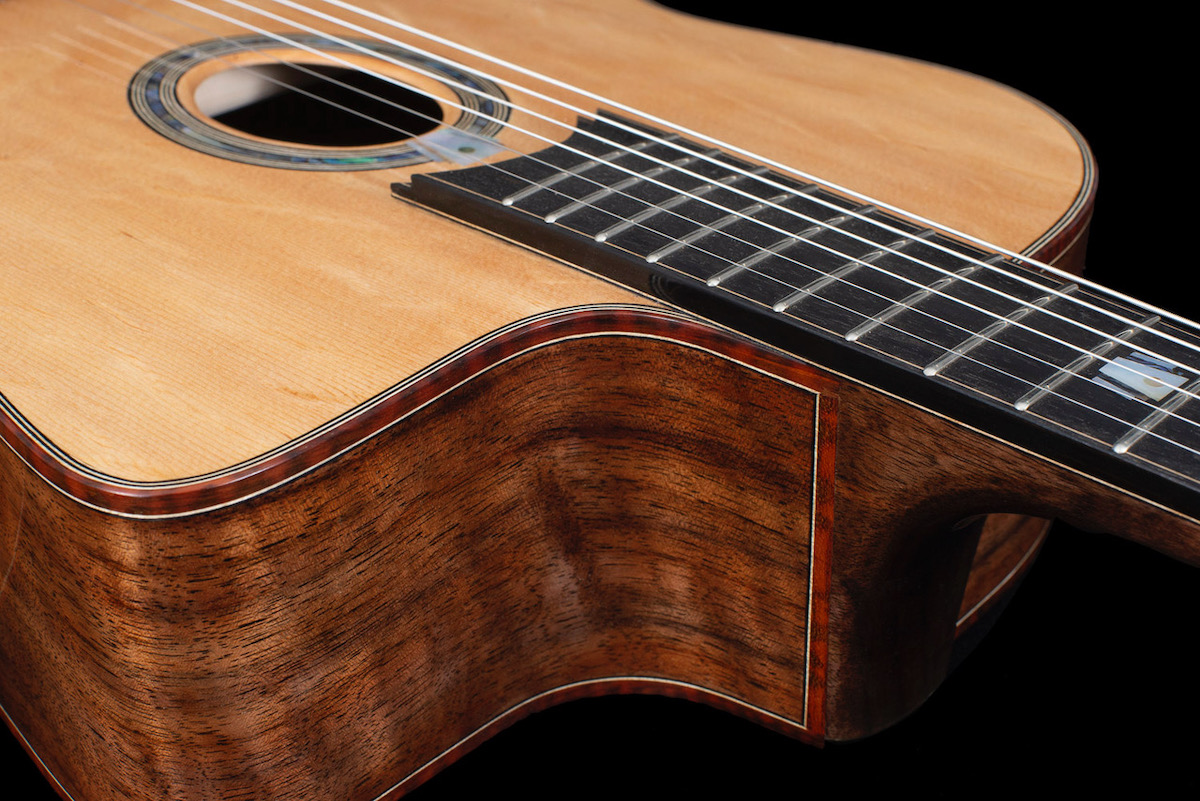This wonderful Cornish workshop and museum is dedicated to the legacy of studio pottery trailblazer Bernard Leach
12 questions for Alex Bishop: guitar maker, educator and musician
12 questions for Alex Bishop: guitar maker, educator and musician
12 Jan 2024
Alex Bishop is a brilliant guitar luthier who is also a past recipient of an Arts Society bursary. We catch up with him on his craft, the impact of that bursary and what his hopes are now for the future
 Alex in his Bristol workshop
Alex in his Bristol workshop
The Arts Society / Cockpit Arts Award supports professional craftspeople working in traditional craft skills that are at risk of dying out. Each bursary recipient receives one year of business support and a subsidised studio space at Cockpit Arts in London. Today we meet luthier Alex Bishop, maker of beautiful guitars.
First, let’s define the word ‘luthier’.
Put simply, a luthier is a maker of stringed instruments, such as violins or guitars. The word is thought to be derived from the French for ‘lute’ and originally referred to makers of lutes.
Is there a luthier in history whose work you particularly admire?
I love the work of Luigi Mozzani (1869–1943). He was a concert guitarist who worked out of a rural village in northern Italy. His work was exceptionally creative, and his technological developments in the world of guitar making were remarkably innovative.
What was the first guitar you ever made?
It was a travel guitar, designed to be strapped to the side of a backpack, so the shape was very slim: it almost looked like a paddle for a rowing boat. I was a little disappointed with the sound of it, but I learnt how important it was for the front of the guitar to have a large surface area so it can vibrate fully to produce a resonant sound.

Tell us about the impact of winning the bursary.
I won The Arts Society / Cockpit Arts Award at the end of 2010, and moved into the workshop at Cockpit Studios in early 2011. The award was fundamental for me in opening the doors to pursuing my career. Without it I would never have been able to invest enough of my time into refining my craft to a point where I was able to run my own business.
I genuinely feel that by cultivating a society of craftspeople and artists running successful, independent businesses we are enhancing the world, amplifying the richness and diversity of the best aspects of humanity. Art celebrates the very best of what we can get from life, so right now new generations of artists and craftspeople are more valuable than ever.
 An OM folk guitar in English cherrywood
An OM folk guitar in English cherrywood
Where do you work now?
My workshop is in Bristol and my working space is organised with a small number of workbenches backed by a large tool wall that reflects the handcrafted processes that I use. I want visitors to my workshop to feel they have entered an authentic craftsman’s space; a real-life Geppetto’s workshop from Pinocchio, filled with mystery and intrigue!
 Alex’s 000 folk guitar, with striped fingerboard
Alex’s 000 folk guitar, with striped fingerboard
Do you have a favourite guitar?
Of those I have built myself, my favourite would probably be a folk guitar I made a few years ago with a striped fingerboard. Even though my work has a strong visual element, the part of the guitar that is most important to me is the sound. That particular instrument was exceptionally delicate, but the sound was extraordinarily powerful and rich.
And a favoured piece of guitar music?
Many years ago I discovered a French group called Les Doigts de l’Homme. I fell in love with their music and I have never heard anything like them since. I’ll take any piece of music by them, but the title track from their album Le Coeur Des Vivants is a particular favourite. I also have a penchant for traditional folk music, especially anything by Bert Jansch and John Renbourn.
What’s the first stage in making a guitar?
I start by bending the sides. It is important to be able to visualise what you’re building, and getting the outline of the instrument right is a bit like the preliminary pencil sketches of a big painting. Get that right and you'll end up with a successful build.
 The finished article
The finished article
What is the biggest challenge?
The finishing. I prefer to French polish my guitars because this results in the best sound. The process is long and arduous, with hours of hand-applied finish. The surface preparation has to be perfect too – as the finish is so thin, any dents or scratches in the wood will show.
How do you know when a piece is finished?
It’s never finished! Even well-seasoned wood is always on the move, responding to changes in its environment. A well-built guitar has to be able to breathe; if it is overbuilt the sound suffers, so it is necessary to return to working on an instrument long after the strings go on, to keep it playing well and sounding perfect.
 Sharing knowledge in the workshop
Sharing knowledge in the workshop
What does the future hold?
I’m continuing to make guitars – building more traditional round-hole, steel-string ‘folk’ guitars, not just the gypsy jazz guitars I am better known for. But it is now the growth of my teaching and courses that holds a particular excitement. I am developing the teaching side of my business: the Bristol Guitar Making School. The goal is to see the skills of guitar making made accessible to everyone, regardless of background or experience. We are offering long- and short-term courses as well as flexible lessons in both one-to-one and group settings.
We have a broad spectrum of students, but I am keen to encourage more young students to join and develop their craft skills. We are currently seeking sponsorship to help fund an annual under-25s programme to offer guitar-making opportunities to those who would otherwise be unable to afford to do it. In many ways this takes me back to that first important opportunity to develop my practice, which came with the bursary; it still resonates today. Just as I was given the chance, I want to be able to offer other aspiring guitar makers a similar opportunity to access learning through practice.
 An oval-hole gypsy jazz guitar
An oval-hole gypsy jazz guitar
What advice would you give to someone wanting to become a luthier?
Follow your instincts – there are many guitarists with opinions about what creates the perfect-sounding instrument, but nothing teaches you how to build a great instrument better than experience! Don’t be afraid to fail. I’ve always learnt more from the instruments that didn’t work out so well, than from the ones that did.
Find out more!
Alex Bishop Guitars: alexbishopguitars.com
Bristol Guitar Making School: guitarmakingschool.co.uk
The Arts Society GLA Bursary at Cockpit: cockpitstudios.org/awards/arts-society-gla-bursary
See
The short film The Craft of Sound showing Alex at work in his workshop here vimeo.com/133214744
JOIN OUR MAILING LIST
Become an instant expert!
Find out more about the arts by becoming a Supporter of The Arts Society.
For just £20 a year you will receive invitations to exclusive member events and courses, special offers and concessions, our regular newsletter and our beautiful arts magazine, full of news, views, events and artist profiles.
FIND YOUR NEAREST SOCIETY
MORE FEATURES
Ever wanted to write a crime novel? As Britain’s annual crime writing festival opens, we uncover some top leads
It’s just 10 days until the Summer Olympic Games open in Paris. To mark the moment, Simon Inglis reveals how art and design play a key part in this, the world’s most spectacular multi-sport competition



